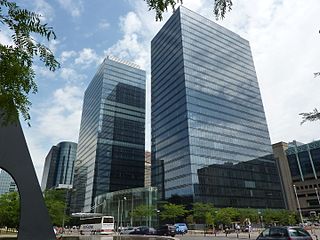
The politics of Belgium take place in the framework of a federal, representative democratic, constitutional monarchy. The King of the Belgians is the head of state, and the prime minister of Belgium is the head of government, in a multi-party system. Executive power is exercised by the government. Federal legislative power is vested in both the government and the two chambers of parliament, the Senate and the Chamber of Representatives. The federation is made up of (language-based) communities and (territorial) regions. Philippe is the seventh and current King of the Belgians, having ascended the throne on 21 July 2013.

The economy of Belgium is a highly developed, high-income, mixed economy.

The German Confederation was an association of 39 predominantly German-speaking sovereign states in Central Europe. It was created by the Congress of Vienna in 1815 as a replacement of the former Holy Roman Empire, which had been dissolved in 1806 in reaction to the Napoleonic Wars.
A confederation is a political union of sovereign states or communities united for purposes of common action. Usually created by a treaty, confederations of states tend to be established for dealing with critical issues, such as defence, foreign relations, internal trade or currency, with the central government being required to provide support for all its members. Confederalism represents a main form of intergovernmentalism, defined as any form of interaction around states that takes place on the basis of sovereign independence or government.
Education International (EI) is a global union federation (GUF) of teachers' trade unions consisting of 383 member organizations in 178 countries and territories that represents over 32 million education teachers and education support personnel from pre-school through university. It is one of the world's largest sectoral global union federations.

The Catholic Church and politics concerns the interplay of Catholicism with religious, and later secular, politics. The Catholic Church's views and teachings have evolved over its history and have at times been significant political influences within nations.

Jan Jerzy Kułakowski was a Polish politician and Member of the European Parliament for the Greater Poland Voivodship (2004–2009) with the Freedom Union, part of the Alliance of Liberals and Democrats for Europe and sat on the European Parliament's Committee on Employment and Social Affairs.

The General Confederation of Liberal Trade Unions of Belgium is the smallest of Belgium's three major trade union federations.
The General Labour Federation of Belgium is a socialist national trade union federation in Belgium. It was founded in 1945. It is affiliated with the International Trade Union Confederation and has a membership of 1.5 million. With said membership the ABVV/FGTB is the second largest of the three major trade unions in Belgium, closely following the Confederation of Christian Trade Unions (ACV/CSC) which has 1.6 million members and dwarfing the General Confederation of Liberal Trade Unions of Belgium (ACLVB/CGSLB) which has approximately 300,000 members. During the bulk of its history the ABVV/FGTB remained closely affiliated with the Belgian Socialist Party which was split in 1978 into a Flemish and a Walloon social-democratic party. While remaining formally independent from any political party, the ABVV/FGTB noticed the increasing influence by the marxist Workers' Party of Belgium amongst its active base during the last decade.

The Japanese Trade Union Confederation (JTUC), commonly known as RENGO, is the largest national trade union center in Japan, with over six million members as of 2011. It was founded in 1989 as a result of the merger of the Japan Confederation of Labor (Dōmei), the Federation of Independent Unions and the National Federation Of Industrial Organisations (Shinsanbetsu). In 1990, the General Council of Trade Unions of Japan (Sohyo) also joined RENGO.
The European Trade Union Confederation was set up in 1973 to promote the interests of working people at the European level and to represent them in the European Union institutions. It is recognized by the European Union, the Council of Europe, and the European Free Trade Association as the only representative cross-sectoral trade union organization at the European level.

The Duchy of Limburg was created in 1839 from parts of the Dutch Province of Limburg as a result of the Treaty of London. Its territory was the territory of the modern day province of Limburg with the exceptions of the cities of Maastricht and Venlo. The Duchy of Limburg was also a member state of the German Confederation.
Trade unions in Colombia were, until around 1990, among the strongest in Latin America. However the 1980s expansion of paramilitarism in Colombia saw trade union leaders and members increasingly targeted for assassination. As a result, Colombia has been the most dangerous country in the world for trade unionists for several decades. Between 1986 and 2010 over 2800 labor leaders were killed according to one source, and over 4000 according to others. Most assassinations were carried out by paramilitaries or the Colombian military; some were carried out by the guerrillas. In 2009 only around 4% of workers in Colombia were unionized.
Pillarisation is the vertical separation of citizens into groups by religion and associated political beliefs. These societies were divided into two or more groups known as pillars. The best-known examples of this have historically occurred in the Netherlands and Belgium.
The World Union of Liberal Trade Union Organizations known by its French acronym UMOS-BESL is a trade union federation of liberally inclined unions.
Omer Liévin Benjamin Becu was a Belgian trade unionist, who became General Secretary of the International Confederation of Free Trade Unions.
The Trade Union Commission was a national trade union federation in Belgium.

Liberal Democrats is a minor French-speaking political party in Belgium.









